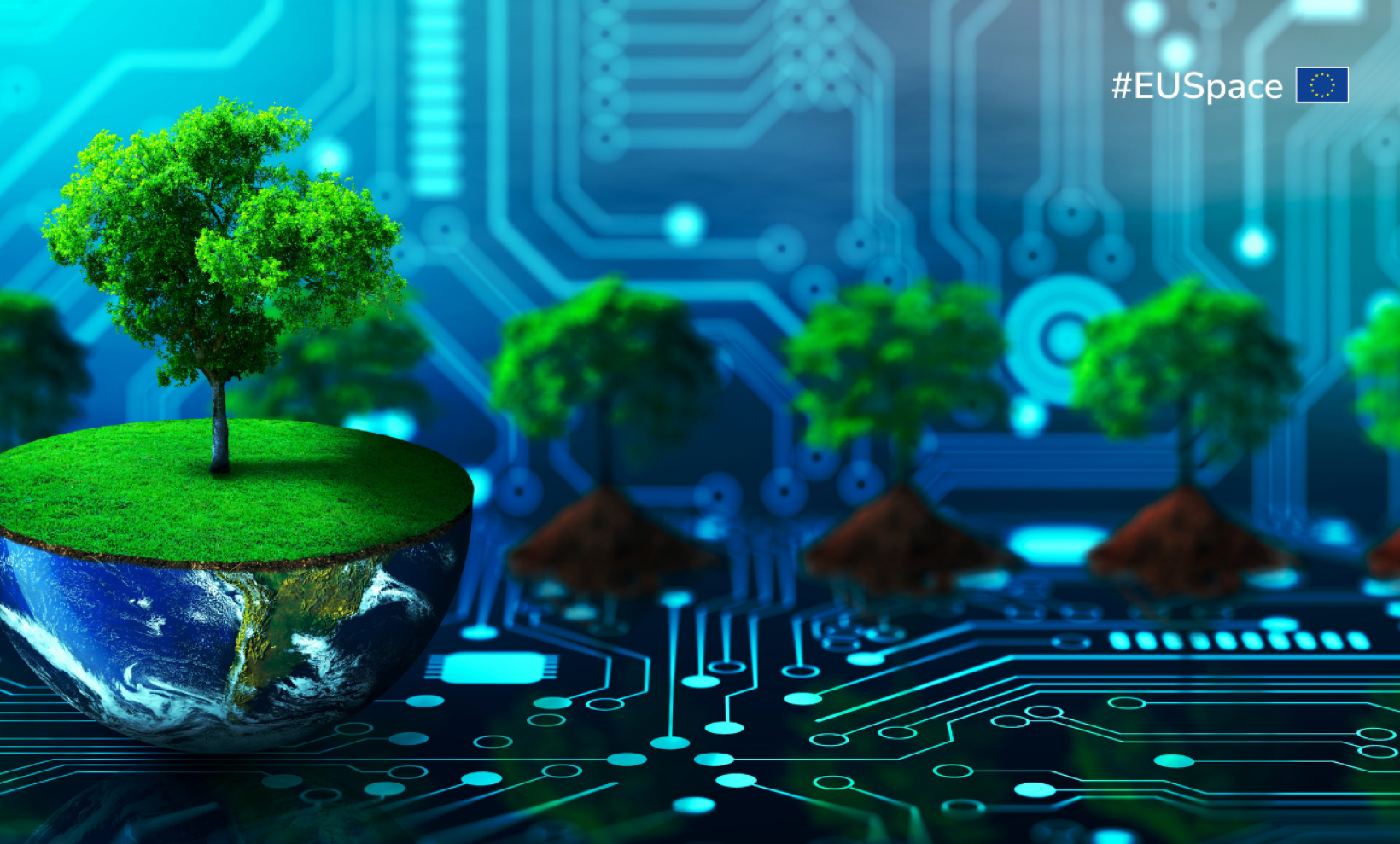
A famous frog once sang, ‘it’s not easy being green’.
Clearly, he didn’t know about EU Space. “With the wealth of data, services and information that the EU Space Programme provides, ‘being green’ has become a whole lot easier,” says EUSPA Executive Director Rodrigo da Costa.
As Europe prepares to celebrate EU Green Week from 3 – 11 June, let’s look at some of the ways EU Space supports the package of policies and initiatives that is the European Green Deal – Europe’s roadmap to becoming the world’s first climate neutral continent.
Energy Performance of Buildings Directive
Our homes, offices, schools, hospitals, libraries, and other buildings are, collectively, the single largest consumer of energy. They’re also one of the largest emitters of carbon dioxide, responsible for 36% of all greenhouse gas emissions.
In other words, the path to climate neutrality starts with energy efficient buildings.
Here, the Copernicus Atmosphere Monitoring Service helps monitor emissions in residential areas of cities. With this information in hand, urban planners can focus on renovating the worst-performing buildings first.
Last year, EUSPA also kicked-off a series of Horizon Europe projects that aim to support the transversal objectives of the European Green Deal. Among these projects, BUILDSPACE aims to enable greener and more sustainable management of buildings and urban areas in European cities, using Digital Twins powered by EU Space data. The city services of Piraeus, Riga and Ljubljana are expected to validate the digital twin services delivered by the project.
Renewable Energy Directive / RePowerEU
Today, approximately 22% of the EU’s energy comes from renewable sources. These initiatives seek to not only more than double this, but to do so in just a few years’ time.
Unfortunately, we don’t have a ‘magic switch’ that we can flip to go from our current fossil fuel- based energy system to one based on renewables. But what we do have is EU Space. A recently initiated EUSPA project called RESPONDENT uses Galileo timing and synchronization services to allow for smarter grid monitoring, improved power balancing and overall better operation of the infrastructure of renewable energy sources.
From choosing the best location for wind turbines to understanding how dust storms might impact solar energy production, the EU Space Programme will be a key enabler of Europe’s energy transition.
Corporate Sustainability
Reporting Directive Large listed businesses, banks and insurance companies with over 500 employees are required to reports on their Environment-Social-Government (ESG) policies and performance. To do so, many are turning to Earth Observation.
High-quality, objective, independent, verifiable, regularly updated, comprehensive, global – these are all reasons why Earth Observation data is so well-suited for environmental risk assessment and monitoring. Furthermore, Earth Observation has the benefit of allowing users to quickly and cost-effectively collect and analyse large amounts of information over a large spatial extent in a consistent, unbiased, repetitive and cost-effective manner.
Regulation on Land Use, Land Use Change & Forestry
Both Galileo and Copernicus play a role in preventing illegal logging. By flagging potential development and road construction happening within forests, Earth Observation data helps authorities look for illegal activity and predict where such activity is most likely to occur. Authorities can also leverage the precise positioning provided by Galileo to track timbre movements, which increases the transparency and traceability of the timber supply chain and reduces the likelihood that illegal exportation goes unnoticed.
Carbon Offset and Reduction Scheme for International Aviation
Once an airline’s collective emissions surpass 2019 levels, CORSIA requires them to offset all additional carbon emissions. But instead of just paying to offset, airlines are also working to reduce their carbon footprint. For example, using Galileo, airlines and airports can improve their ground operations, saving fuel and thus cutting greenhouse gas emissions.
EGNOS also helps make flights more sustainable. On the one hand, EGNOS allows for a smooth, continuous glide path approach that is significantly more fuel efficient. On the other hand, the lower decision height that EGNOS enables can help pilots better evaluate visibility conditions, which in many cases means avoiding the need to circle or divert – two manoeuvres that burn a lot of fuel.
Supporting companies’ green transformations
While each of the above listed initiatives are essential to achieving Europe’s ambitious climate change goals, policy without action amounts to nothing more than empty promises. In fact, each of these goals requires that companies take a deep look at their internal operations, as well as their supply chains, to identify opportunities for reducing their own environmental footprints.
Here too EU Space plays a role.
While the EU Space Programme and the data and services it provides are important assets to supporting the implementation of the Green Deal, businesses stand to benefit too. For example, Copernicus, Galileo and EGNOS supply the information companies need to monitor environmental indicators, reduce their environmental impact, comply with relevant policies and regulations, become more sustainable and drive the green transformations. Better yet, much of this data is openly accessibly and provided free of charge.
To help companies utilise this data as a means of driving their own sustainability journeys, EUSPA has published its first EU Space for the Green Transformation report. The practical guide is full of best practices and real-world examples on how EU Space can make being green easier for companies of all shapes, sizes and sectors.
“If this report is a trusted roadmap for a green transformation and sustainability journey for companies willing to evolve towards a sustainable future, EUSPA's work on Horizon Europe also creates new opportunities for businesses and reinforces the Union's green ambition. Together, we can drive positive change and seize the benefits of sustainable practices, " concludes da Costa.
You can download your free copy of the EU Space for the Green Transformation report here.

